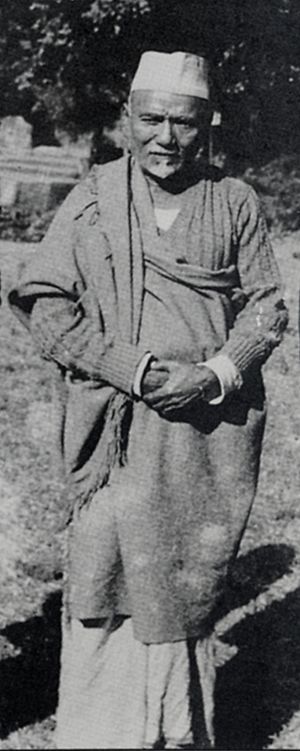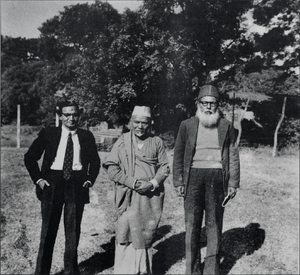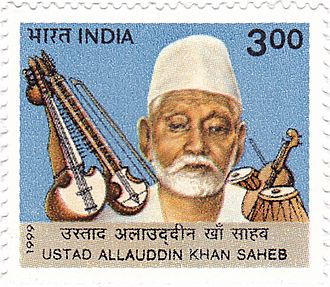Allauddin Khan facts for kids
Quick facts for kids
Allauddin Khan
|
|
|---|---|

Khan at Burdwan House in Dhaka in 1955
|
|
| Background information | |
| Born | c. 1862 – c. 10 Shibpur, Bengal Presidency, British India (now Bangladesh) |
| Died | 6 September 1972 (aged 109–110) |
| Genres | Hindustani classical music |
| Occupation(s) | Composer, sarodiya |
| Instruments | Shehnai, sarod, sitar, bansuri |
Allauddin Khan, also known as Baba Allauddin Khan (8 October 1862 – 6 September 1972) was an Indian sarod player and multi-instrumentalist, composer and one of the most notable music teachers of the 20th century in Indian classical music.
Contents
Early life
Khan was born in Shibpur village in Brahmanbaria (in present-day Bangladesh). His father, Sabdar Hossain Khan, was a musician. Khan took his first music lessons from his elder brother, Fakir Aftabuddin Khan. At age ten, Khan ran away from home to join a jatra party where he was exposed to a variety of folk genres: jari, sari, baul, bhatiyali, kirtan, and panchali.
Khan went to Kolkata, where he met a physician named Kedarnath, who helped him to become a disciple of Gopal Krishna Bhattacharya (also known as Nulo Gopal), a notable musician of Kolkata in 1877. Khan practiced sargam for twelve years under his guidance. After the death of Nulo Gopal, Khan turned to instrumental music. He learned to play many indigenous and foreign musical instruments like sitar, flute, piccolo, mandolin, banjo, etc., from Amritalal Dutt, a cousin of Swami Vivekananda and the music director of the Star Theatre. He learnt to play sanai, naquara, tiquara and jagajhampa from Hazari Ustad and pakhawaj, mridang and tabla from Nandababu.
Ali Ahmed referred Allauddin to veena player Wazir Khan.
Career
Khan became court musician for the Maharaja of Maihar. Here he laid the foundation of a modern Maihar gharana by developing a number of ragas, combining the bass sitar and bass sarod with more traditional instruments and setting up an orchestra. In 1935, he toured Europe, along with Uday Shankar's ballet troupe, and later also worked at his institute, Uday Shankar India Culture Centre at Almora for a while. In 1955, Khan established a college of music in Maihar. Some of his recordings are made at the All India Radio in 1959–60.
Awards
Khan was awarded the Padma Bhushan in 1958 and the Padma Vibhushan in 1971, India's third and second highest civilian honours, and prior to that in 1954, the Sangeet Natak Akademi awarded him with its highest honour, the Sangeet Natak Akademi Fellowship for lifetime contribution to Indian music.
Legacy
Khan's son Ali Akbar Khan, daughter Annapurna Devi, nephew Raja Hossain Khan and grandson Aashish Khan went on to become musicians. His other disciples include Ravi Shankar, Nikhil Banerjee, Vasant Rai, Shripad Bandopdhyay, Pannalal Ghosh, Bahadur Khan, Rabin Ghosh, Sharan Rani, Nalin Mazumdar, Jotin Bhattacharya, Rajesh Chandra Moitra and W. D. Amaradeva.
Khan's house was in Maihar. This house has been restored by Ambica Beri as part of a development that includes an artists and a writers retreat nearby.
Personal life
Anecdotes about Khan range from throwing a tabla tuning hammer at the Maharaja himself to taking care of disabled beggars. Nikhil Banerjee said that the tough image was "deliberately projected in order not to allow any liberty to the disciple. He was always worried that soft treatment on his part would only spoil them".
Films
- Ustad Alauddin Khan (1963), a documentary directed by Ritwik Ghatak.
- Baba Alauddin Khan (1965), a documentary by Indian film director Harisadhan Dasgupta.
- Raga (1971), directed by Howard Worth. Remastered version released in 2010 by East Meets West Music.
- Maihar Raag (1993), directed by Sunil Shanbag. A look at Allauddin Khan's crumbling heritage in Maihar, which won the National Film Award for Best Non-Feature Film in 1994.



